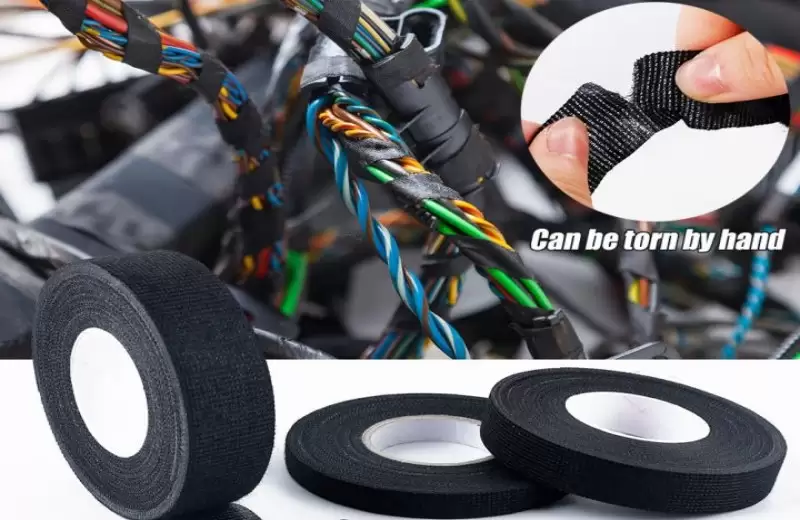
If you're like most car owners, you've probably opened your hood and noticed some exposed wires. Your first instinct might be to grab that trusty roll of electrical tape from your toolbox. It works for household repairs, so why not for your car? This question comes up constantly in auto repair forums and DIY garages.
The short answer might surprise you: Regular electrical tape is one of the worst things you can use on engine bay wires.
As experts with over 15 years at QKD specializing in automotive adhesives, we want to explain exactly why this common solution can lead to serious problems, and what you should use instead.
Why Your Engine Bay is a Tape's Worst Nightmare
Think about what happens under your hood. The environment is brutal - completely different from your home's wiring inside walls.
The Heat Problem
Engine compartments get extremely hot. While basic electrical tape might handle brief exposure to heat, it can't survive constant high temperatures. The adhesive softens, then melts. The tape itself can become brittle and crack. We've seen cases where standard tape literally slid off wires after a few weeks of summer driving.
The Vibration Challenge
Your engine doesn't just sit still - it vibrates constantly. This shaking and movement causes friction. Regular tape isn't designed to withstand this kind of mechanical stress. It loosens, unwraps, and leaves your wires exposed again.
Chemical Exposure
Engine bays contain oil, fuel, coolant, and various cleaning solvents. These chemicals can break down both the tape backing and the adhesive. What starts as a secure wrap becomes a sticky, messy failure.
The Right Tool for the Job: Automotive-Grade Solutions
This is where specialized automotive harness tape comes in. These aren't just fancy versions of electrical tape - they're engineered specifically for the challenges of vehicle environments.
What Makes Automotive Tape Different?
1.Temperature resistance that matches engine compartment requirements
2.Vibration-proof adhesives that stay put
3.Chemical resistance to withstand fluids and cleaners
4.Durable backing materials that don't tear or degrade
At QKD, we've spent years developing tapes that meet these exact demands. Our engine harness tape formulations undergo rigorous testing to ensure they perform when it matters most.
Understanding Your Options: Types of Automotive Wiring Tapes
Cloth Wiring Tape - The Classic Choice
Many people don't realize that cloth wiring tape has been protecting vehicle wires for decades. This traditional solution offers excellent abrasion resistance and can handle high temperatures. Modern versions have improved adhesives that provide better staying power than older varieties.
The beauty of cloth tape lies in its flexibility and breathability. It conforms well to complex wire bundles and doesn't trap moisture like some plastic tapes might. Many restoration projects and classic car enthusiasts still prefer cloth tape for its authentic look and proven performance.
Professional-Grade Harness Tapes
Today's electrical harness tape options include sophisticated materials like:
1.PVC-based tapes with enhanced temperature ratings
2.Polyester and vinyl composites for extreme conditions
3.Specialty films with reinforced adhesive systems
These modern car wire harness tape products represent significant advances over basic electrical tape. They're what manufacturers use in original equipment and what professional installers rely on for aftermarket applications.
When Tape Isn't Enough: Other Protection Methods
While tape plays a crucial role, complete wire protection often involves multiple approaches:
Loom Conduit
Plastic split loom provides excellent mechanical protection against abrasion. The combination of loom with the right automotive harness tape creates a robust protection system.
Heat Sleeving
For areas near exhaust manifolds or other extreme heat sources, specialized heat-resistant sleeves offer protection beyond what any tape can provide.
Proper Connection Methods
No amount of tape can fix poor connections. Using proper crimping tools, soldering where appropriate, and applying the correct engine harness tape for the specific application all work together for reliable results.
The QKD Difference: Why Experience Matters
Through our 15+ years in the industry, we've learned that not all automotive tapes are created equal. Small differences in formulation can make huge differences in real-world performance.
We've seen what happens when inferior tapes fail - the melted adhesive, the unraveled wraps, the electrical problems that result. That's why we're passionate about educating consumers and professionals alike about making the right choices.
Our car wire harness tape products undergo testing that mimics years of engine bay exposure in just months. We test for temperature cycling, chemical resistance, vibration endurance, and long-term adhesion. This commitment to quality ensures that when you choose QKD tape, you're getting protection you can trust.
Best Practices for DIY Wire Protection
If you're working on your vehicle's wiring, here are some key tips:
1.Clean surfaces thoroughly - Any oil or grease will prevent proper adhesion
2.Use the right overlap - Generally 50% overlap ensures complete coverage
3.Stretch properly - Some tapes require slight stretching for optimal performance
4.Don't mix types - Different tapes can interact poorly with each other
5.Inspect regularly - Check your tape work during oil changes or maintenance
The Bottom Line: Skip the Hardware Store Tape
While that roll of electrical tape in your drawer might seem convenient, it's simply not designed for automotive use. The few dollars you might save aren't worth the potential electrical problems, breakdowns, or safety hazards.
Investing in proper automotive harness tape means your repairs will last, your electrical system will be protected, and you won't be redoing the same job months later.
At QKD, we've built our reputation on providing tapes that professionals trust and DIYers can rely on. Whether you're repairing a single wire or building a complete harness, using the right materials makes all the difference.
Remember: Your vehicle's electrical system is too important to protect with anything less than the right tools for the job.
RELEVANT POST
How to Remove Wiring Harness Tape – QKD Automotive Wiring Repair Guide
